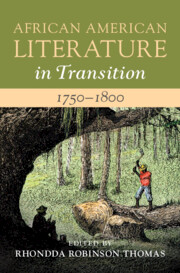Book contents
- African American Literature in Transition, 1750–1800
- African American Literature in Transition
- African American Literature in Transition, 1750–1800
- Copyright page
- Contents
- Contributors
- Preface
- Chronology
- Introduction
- Part I Limits and Liberties of Early Black Print Culture
- Part II Black Writing and Revolution
- Chapter 4 Anglo-Africans Writing Themselves into History during the Age of Revolution
- Chapter 5 Joining the Revolution
- Chapter 6 Black Literary Engagement with the Haitian Revolution
- Part III Early African American Life in Literature
- Part IV Evolutions of Early Black Literature
- Index
Chapter 4 - Anglo-Africans Writing Themselves into History during the Age of Revolution
from Part II - Black Writing and Revolution
Published online by Cambridge University Press: 01 April 2022
- African American Literature in Transition, 1750–1800
- African American Literature in Transition
- African American Literature in Transition, 1750–1800
- Copyright page
- Contents
- Contributors
- Preface
- Chronology
- Introduction
- Part I Limits and Liberties of Early Black Print Culture
- Part II Black Writing and Revolution
- Chapter 4 Anglo-Africans Writing Themselves into History during the Age of Revolution
- Chapter 5 Joining the Revolution
- Chapter 6 Black Literary Engagement with the Haitian Revolution
- Part III Early African American Life in Literature
- Part IV Evolutions of Early Black Literature
- Index
Summary
Slavery, Christianity, the Enlightenment, and the American Revolution were primary forces that shaped African American literary production during the eighteenth century. Slavery was the force that brought most Africans and Europeans into intense personal contact and influenced Africans’ thinking about Western ideas and ideals. Christianity was the message that prompted several Africans to write, modified their beliefs, and highlighted the contrast between what Christians said and the way they often lived and treated enslaved and other Africans. This disjunction was a constant theme in the writings of Africans who acquired this skill in the eighteenth century. The Enlightenment fostered racialist and racist thought concerning Africans and encouraged some Europeans to test these ideas by educating Africans and some Africans to dispute these ideas through literary expression. The so-called Age of Revolution fueled secular and not just religious attacks on slavery and Western hypocrisy. It is not always possible to separate African literary expression in Europe and America or even Africa during the eighteenth century because the world at the time was more truly Atlantic than some may currently suppose.
- Type
- Chapter
- Information
- African American Literature in Transition, 1750–1800 , pp. 99 - 122Publisher: Cambridge University PressPrint publication year: 2022



